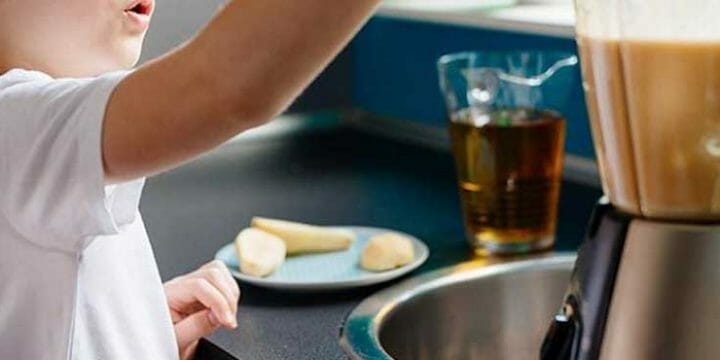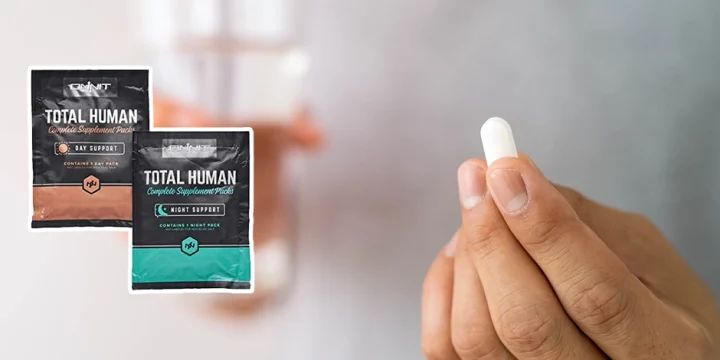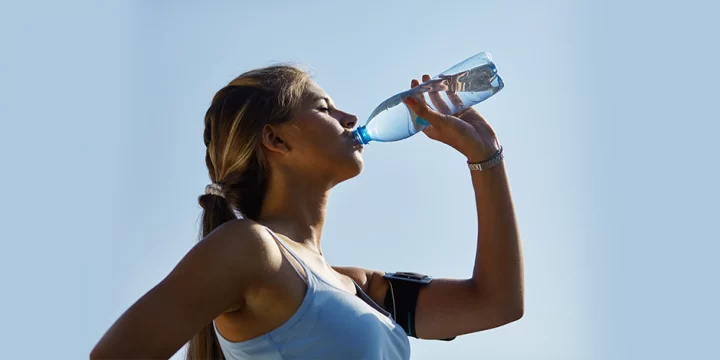As a personal trainer, I get all my clients to focus heavily on their drinking water intake before, during, and after working out. But another excellent approach is to use drinking water for increased weight loss and fat-burning.
The problem is that it’s not just down to drinking more throughout the day.
So I teamed up with a doctor and metabolic specialist to research how drinking water can help with fat loss and what timing might be necessary.
Here’s what we found.
Quick Summary
- Drinking water before meals and first thing in the morning can significantly enhance weight loss by promoting fullness and increasing metabolic rate.
- Maintaining hydration before, during, and after exercise is crucial for optimal physical performance and recovery.
- A study in the Journal of Clinical Endocrinology & Metabolism revealed that drinking 16 ounces of water can increase energy expenditure by 24% for an hour.
- Based on my experience, integrating strategic water consumption into daily routines is a simple yet powerful tool for weight management.
When Should You Drink Water To Lose Weight?
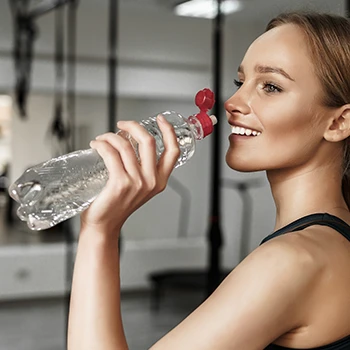
The best time to drink water for loss of weight is before meals to promote a sense of fullness and potentially reduce calorie intake.
A study in the Journal of Clinical Endocrinology & Metabolism has shown that drinking about 16 ounces of water (500 ml) in less than five minutes can trigger thermogenesis and a 24% increase in energy expenditure for 60 minutes [1].
That means if you drink a pint of warm water relatively fast, your body temperature will slightly increase by burning off some extra fat.
The other thing you can achieve by drinking water first thing in the morning is feeling full, making it easier to extend your overnight fasting time [2]. And that should mean that it’s much easier to postpone your breakfast until after 10 am and after exercise.
Ultimately, you could be boosting your fat-burning significantly with something as simple as a pint of drinking water. Being mindful of your calorie intake and incorporating adequate water consumption at strategic times throughout the day, can contribute to effective weight loss and overall health.
Water Intake and Electrolyte Balance During Exercise
When we exercise, our bodies undergo a significant amount of stress, leading to the loss of water and electrolytes through sweat. This loss can have a direct impact on our physical performance and overall health.
Maintaining a proper balance of hydration and electrolytes is crucial for anyone engaged in physical activity, whether it's a light jog or an intense workout session.
Drawing from my experience as an athlete, I've learned that hydration is key to performance and recovery.
A good rule of thumb is to drink water throughout the day leading up to your workout, hydrate every 20 minutes during physical activity, and replace any lost fluids after your exercise session.
Listening to your body's thirst signals and monitoring the color of your urine (aim for a light straw color) are practical ways to assess your hydration status.
The Role of Water in Digestion and Nutrient Absorption
Proper hydration is essential for metabolic processes. Water is necessary for the transportation of nutrients and oxygen to cells, facilitating the efficient burning of calories.
By maintaining good hydration levels, you can ensure that your body metabolizes food effectively, which is crucial for weight management and overall health.
I've found that drinking water before and during meals greatly improved my digestion. It's not just about aiding digestion; it also helped me manage my appetite better, preventing overeating by creating a sense of fullness.
However, it's important to avoid excessive water intake during meals, as it can dilute digestive juices. Drinking lukewarm or room-temperature water is often recommended for optimal digestion.
Does The Volume Of Water Matter?
Yes, the volume of water matters a lot when it comes to loss of weight through the increase fluid intake. And it’s where people tend to make simple mistakes.
According to WebMD, the general recommendation is to drink eight glasses of water daily [3].
But simply sticking with that recommendation and having a glass of drinking water every one to two hours won’t do much for weight loss.
According to a study in the National Library of Medicine, this will still give you health benefits, but you must drink about 16 ounces of water within a few minutes to achieve weight loss, ideally before meals [4].
So, don’t assume that you’ll boost your calorie burning simply by drinking enough water during the day.
Tips To Avoid Dehydration
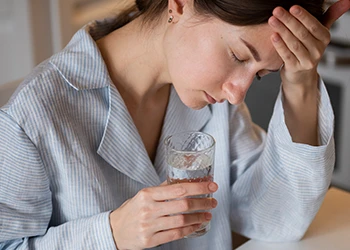
The other thing you need to remember is that you probably won’t get the same thermogenic effect from a pint of drinking water if you haven’t been drinking enough during the day.
What I mean is this.
If you had a pint of drinking water in the morning and then spent most of the day just drinking coffee or nothing at all, your body will be craving drink water by the afternoon.
“If you don’t get enough water, you can become dehydrated. Severe cases of dehydration can cause dizziness, confusion, and even seizures.”
- Hansa D. Bhargava, MD, WebMD.com
So, the one tip I give all my clients is to set a timer on their smartwatch or phone every 30 to 60 minutes. Also, buy one of those Super Sparrow bottles that give you an exact measure of how much drinking water you’re filling up.
Every time you finish a bottle, record it along with your food journaling and make sure that it all adds up to at least eight glasses per day.
FAQs
How Much Water Should You Drink A Day To Lose Weight Fast?
You should aim to drink over 60 ounces of water a day to lose weight. This will depend on your gender, height, weight, and environmental temperature, but it’s a good starting guide to boost your weight loss efforts.
Does Drinking Too Much Water Make You Fat?
No, drinking too much water doesn’t make you fat. While you might experience temporary water weight gain, your body will flush out that excess fluid through the kidneys.
Should I Drink Water While Working Out?
Yes, you should drink water while working out to stay hydrated, maintain performance, and prevent overheating and dehydration, especially during long or intense exercise sessions.
References:
- https://academic.oup.com/jcem/article/92/8/3334/2598681?login=false
- https://www.businessinsider.com/how-drinking-water-affects-weight-loss-and-satiety-2016-7?r=US&IR=T
- https://www.webmd.com/diet/how-much-water-to-drink
- https://www.ncbi.nlm.nih.gov/pmc/articles/PMC3809630/
About The Author
You May Also Like

